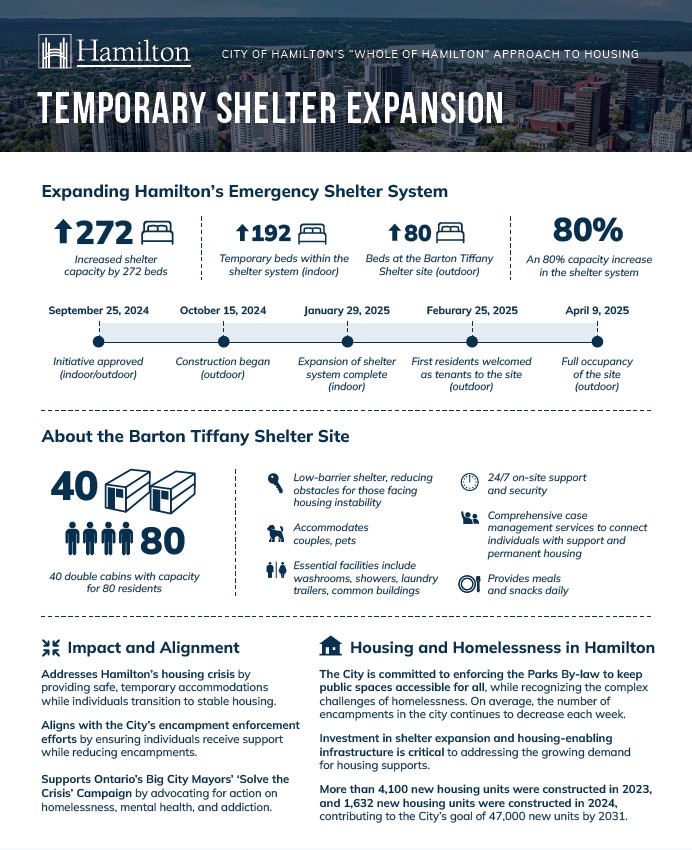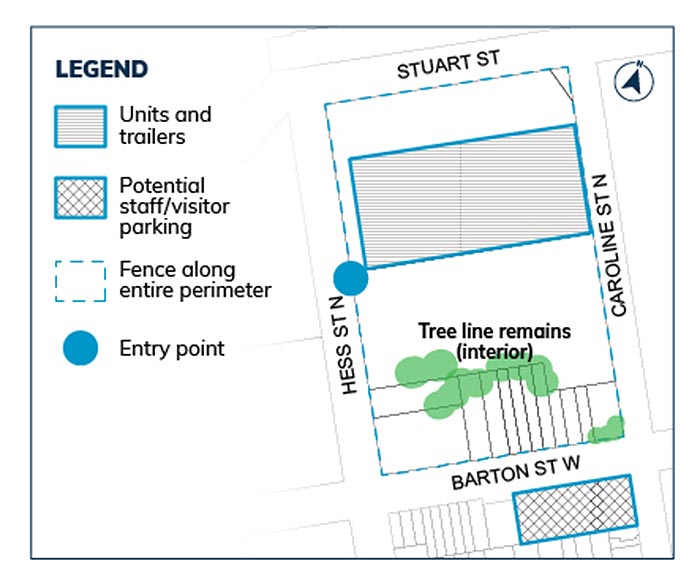Approved Temporary Shelter Expansion

Reducing Homelessness and Managing Encampments
The City of Hamilton continues to face significant challenges related to housing affordability and homelessness. Addressing these issues requires a coordinated effort involving the City, community partners, and Provincial and Federal governments. These challenges are not unique to Hamilton but reflect broader systemic issues across Canada, where rising housing costs and inadequate support systems have led to increased homelessness and the visibility of encampments, exacerbated by and through the COVID-19 pandemic.
Phasing Plan
The Temporary Barton Tiffany Shelter will provide an additional 80 beds through the emergency shelter expansion and will prioritize couples in domestic relationships and individuals with pets.
The new accommodation will include:
- 20 individual units which offering 40 beds for singles
- 20 double-occupancy units providing 40 beds for couples
Construction was completed in phases to ensure timely access to shelter for those in need. The City, in partnership with our construction teams, worked diligently to install all 40 structures on site. The phased approach allowed for a structured rollout, with estimated completion dates provided for each phase.
Construction phases and expected completion timelines
As of Friday March 14, 2025, installation of all units is complete, which means the following units are operational at the Temporary Barton Tiffany Shelter:
• Single Units - 40 (20 structures)
• Double Occupancy Units - 40 (20 structures)

| Construction Phase | Estimated Completion Date |
|---|---|
| Phase 1 - Singles (Units 1, 5, 8, 13, 17, 21) | ✓ Completed |
| Phase 2 - Couples (Units 3, 7, 11, 15, 19, 23) | ✓ Completed |
| Phase 3 - Couples (Units 4, 8, 12, 16, 20, 24) | ✓ Completed |
| Phase 4 - Singles (Units 2, 6, 10, 14, 18, 22) | ✓ Completed |
| Phase 5 - Singles (Units 25, 29, 33, 27) | ✓ Completed |
| Phase 6 - Singles (Units 26, 30, 34, 38) | ✓ Completed |
| Phase 7 - Couples (Units 27, 31, 35, 39) | ✓ Completed |
| Phase 8 - Couples (Units 28, 32, 36, 40) | ✓ Completed |
The City is addressing the urgent need for shelter services by activating additional beds through strategic partnerships with community providers. Total number of beds onboarded as of January 29, 2025 = 192
These initiatives are critical steps in providing immediate relief while we continue to focus on connecting people to stable, permanent housing and the resources they need for a secure future.
The City will continue to provide ongoing updates on these efforts to address community and neighbourhood level concerns as we work toward long-term solutions.
Temporary Outdoor Shelter Expansion Progress
As of week of: February 28, 2025
| Project Milestones | Status |
|---|---|
| Secure constructor for site preparation | ✓ Complete |
| Operator identified (Good Shepherd) | ✓ Complete |
| Install fencing | ✓ Complete |
| Approve site plan | ✓ Complete |
| On-site construction begins Dec 2 | ✓ Complete |
| Issuance of building permit for the common building | ✓ Complete |
| Complete off-site work – road and pedestrian improvements | ✓ Complete |
| Complete on-site works – pavement, etc. | ✓ Complete |
| Complete electrical connection to the site and within the site | ✓ Complete |
| Delivery of cabins, washroom trailers, common building | ✓ Complete |
| Open temporary outdoor shelter | ✓ Complete |
Barton/Tiffany Frequently Asked Questions
The temporary outdoor shelter is part of the City’s broader, ongoing strategy to address homelessness in Hamilton. This reflects Council’s decision to provide additional low-barrier shelter space in response to the Mayor's directive to establish a temporary outdoor shelter. This is not a standalone project but a crucial component of a larger system that includes housing support programs, rapid re-housing, drop-in services, outreach, and emergency supports.
No. This is a temporary solution as the City works on long-term permanent shelter solutions across Hamilton.
Good Shepherd, who is a local registered charity and non-profit. Good Shepherd’s experienced staff will be on-site 24 hours a day, seven days a week, to support residents.
The City, in collaboration with Good Shepherd, the shelter operator, is facilitating a safe and structured phased move-in process for residents. The shelter is now providing support to residents on-site and will continue welcoming new residents gradually to prioritize the safety and well-being of both residents and the surrounding community.
The site is now operational and actively supporting residents. Key construction milestones achieved to date include:
- Site plan approval completed
- Asphalt paving finished
- Permanent fencing installed both externally and internally
- Waterline installation completed and inspected
- Administrative building fully operational on-site
- Permanent power installed and functional
- Washrooms, showers, laundry installed, inspected and operational.
- All shelter units installed, inspected and operational.
- Site fully turned over to the operator and construction area has been demobilized. The General Contractor may return periodically to complete outstanding work in accordance with the Contract.
These milestones ensure the site is prepared to provide safe and stable support for residents.
Support services will include:
- Case management (a collaborative process that assesses, plans, implements and monitors the options and services required to meet a clients’ health and human service needs),
- Health and mental health care,
- Addiction support (e.g. harm reduction, connections to medical supports)
- Assistance with transitioning to permanent housing, and
- Meals and snacks.
Harm reduction aims to meet people who use drugs where they are at. It may incorporate a wide range of strategies that could include safer drug use, managed use, and abstinence.
The site will have:
- 40 heated and cooled shelter units for up to 80 residents,
- Trailers for washrooms, showers, and laundry, and
- Common buildings for both staff and residents.
The City’s Housing-Focused Street Outreach Team will manage referrals for the 80-bed temporary outdoor shelter and 192 emergency shelter bed expansion, prioritizing individuals currently in encampments. Conversations are ongoing with residents in encampments and referrals will be on a case-by-case basis. The transition to the shelter spaces will be handled with compassion and care.
Yes.
Yes. Rules are being developed to ensure the safety of everyone at the temporary outdoor shelter. Guests will be permitted, but visits will follow an organized and structured process. Details on that process will be managed by Good Shepherd.
Yes. Pets will be accommodated where it is safe to do so. Policies are being developed to ensure the safety of shelter residents, neighbours, and pets. Policies will address both on-site and site-adjacent considerations, including pet-related noise.
There will be staff, including security, on site 24 hours a day, seven days a week, year-round. There will be regular scheduled waste collection and removal and routine site inspections to maintain cleanliness and safety.
There will be staff, including security, on site 24 hours a day, seven days a week, year-round. Staff will address noise and disturbances and will work to de-escalate any conflicts that arise. Fires will not be permitted on the site.
Yes. A portion of land (east of the outdoor shelters) will be used for construction staging until the site is operational. During the winter months, the vacant east/west block of the site may be used as needed for excess snow clearing.
There will be staff, including security, on site 24 hours a day, seven days a week, year-round.
Hamilton Police Services (HPS) will continue to be responsible for public safety issues and criminal matters as outlined in the Community Safety and Policing Act. Good Shepherd, like all other shelter providers, will work with HPS if there are public safety issues and criminal matters at the temporary outdoor shelter. HPS will continue to respond to public safety issues and criminal matters in the surrounding neighbourhood.
The site will follow harm reduction principles to support overall health and safety, addressing both individual and community needs. Support services, including addiction resources (e.g. harm reduction and connections to medical supports), will be available to help residents manage substance use safely and responsibly.
A low-barrier shelter is designed to reduce obstacles that typically prevent people from accessing indoor shelters. This includes accommodation for couples, pets, and secure storage for belongings.
External environmental experts have assessed the site and provided recommendations for on-site mitigation. These include:
- laying an asphalt surface,
- restricting access to unused areas of the property by installing fencing,
- installation of a drainage system,
- installation of a waterproof barrier to block any vapours from contaminants,
- regular inspections of the site,
- installation of appropriate signage, and
- implementation of dust control measures and personal protective equipment during construction.
Key measures will include:
- Occupancy rates,
- Length of stay,
- Access to health and support services,
- Housing stability for residents,
- Effectiveness of on-site services
- Transitions to safe and permanent housing, and
- Community benefit.
The project pilot will be regularly evaluated, and the key measures will inform any adjustments that need to be made throughout the course of the project. The goal of the project is to see an overall decrease in the number of unhoused residents, and reduce the demands and needs for emergency shelter housing.
Results and outcomes will be shared through reports to City Council though the General Issues Committee, which will be posted on the City website.
The temporary shelter is part of a broader plan to address homelessness and housing in Hamilton. Addressing homelessness requires supports across the housing continuum, including both short-term and long-term, permanent solutions.
For more information on the City’s Whole of Hamilton approach to housing, visit www.hamilton.ca/housinginvestments

Infographic description:
Encampments within 1 km of the temporary outdoor shelter will not be permitted once the shelter is fully operational. The City’s Encampment Response Team will work with residents encamped within this radius to transition them to safer, more compassionate, and legal accommodations. The Response Team will clean up litter, and will ensure site cleanup. Staff from Municipal Law Enforcement (MLE) will proactively monitor the 1 km radius area once a week to ensure ongoing compliance. If required, additional visits will be conducted, Trespass Notices may be issued, and the Response Team will follow all necessary steps to seek compliance of the site
All updates, including links Council Reports and Communication Updates, will be posted on this page.
If you have questions or concerns specific to Good Shepherd, please contact [email protected]
If you have questions or concerns specific to the City of Hamilton, please contact [email protected]









